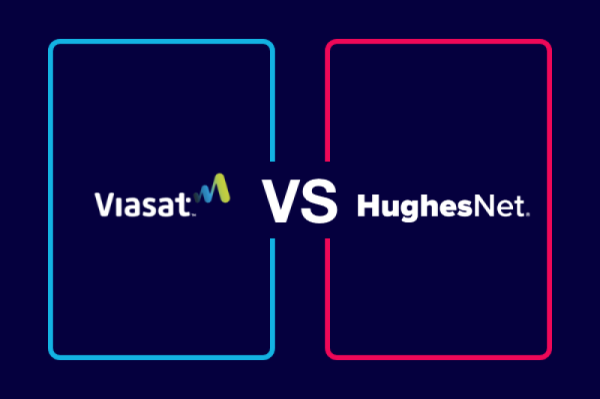The quick answer: Is Viasat or HughesNet better?
Viasat will be a better option for those who really need extra speed and unlimited data. However, their plans tend to be a bit pricier than HughesNet.
HughesNet might be the more affordable option. Every plan comes with speeds up to 25 Mbps, but they offer multiple data plans. You still get unlimited data with every plan, but they slow down your speeds once you hit your data cap. What’s nice is they offer users 50 GB/month of free data to use during 2 a.m. to 8 a.m., perfect for the night owl.
Viasat vs. HughesNet: Price & contracts
Provider | Viasat | HughesNet |
|---|---|---|
Price | Starting at $50/mo | Starting at $49.99/mo |
Contract | 24 months | 24 months |
Our pick for price: HughesNet
Generally speaking, Viasat internet plans tend to be more expensive than HughesNet plans because their introductory pricing only lasts 3 months. After 3 months, prices go up quite a bit and for the remaining 21 months of the contract.
HughesNet internet plans vary in price depending on how much data you want for high-speed internet. Unlike Viasat, plans have consistent prices for the duration of your contract.
Viasat vs. HughesNet: Speeds
Provider | Viasat | HughesNet |
|---|---|---|
Speeds | Up to 12, 25, 30, 100 Mbps | Up to 25 Mbps |
Our pick for speed: Viasat
HughesNet only offers up to 25 Mbps across all of their plans. If you’re only looking to use your internet for casually sending emails, placing Amazon orders, and do some light streaming on 1-2 devices at a time, 25 Mbps will be enough.
For some families, 25 Mbps won’t be enough. Depending on where you live, you can get up to 100 Mbps with Viasat, which is enough to support 4-5 devices at a time.
Viasat vs. HughesNet: Data allowance
Provider | Viasat | HughesNet |
|---|---|---|
Data | Unlimited | Unlimited |
Speeds throttled after | Unlimited Bronze: 40 GB of data Unlimited Silver: 60 GB of data Unlimited Gold: 100 GB of data Unlimited Platinum: 150 GB of data | Plan’s data limit |
Our pick for data: HughesNet
Both satellite internet providers offer unlimited internet to go with your plan, however, both come with soft data caps. Neither provider will charge you extra or cut off your internet if you use too much data, but you’ll experience slower speeds for the remainder of your billing cycle.
Depending on your plan, Viasat will slow down your internet speeds after 40, 60, 100, or 150 GB of data during times of network congestion.
HughesNet allows you to choose your data plan so you pay for how much you need. Even if you hit your data cap, HughesNet allows you to stay connected with reduced download speeds of 1-3 Mbps. One of HughesNet’s perks is their Bonus Zone. Each month you’re allowed an additional 50 GB/month of data during off-peak hours of 2 a.m. to 8 a.m. Bonus Zone comes with every plan, so take advantage of heavy downloading at night.
Viasat vs. HughesNet: Equipment & installation
Provider | Viasat | HughesNet |
|---|---|---|
Equipment | Monthly lease: $9.99 or Flat rate: $299.99 | Monthly lease: $9.99 or Purchase: $349.98 |
Installation | Free standard installation | Free standard installation for new lease subscribers only |
Our pick for equipment and installation: It’s a tie!
All Viasat internet plans come with free standard installation. It costs $9.99/month to lease their satellite equipment, which also includes the cost of built-in WiFi. They also offer an option called “lifetime prepaid” where you’d pay a flat leasing rate of $299.99 upfront. That might be the more cost-efficient option if you’re looking to stay with Viasat for more than 2.5 years.
HughesNet only offers free installation for those that choose to lease their equipment. We recommend leasing over purchasing equipment because leasing equipment comes with free upgrades. We don’t recommend choosing the equipment purchase option. When you purchase the equipment from HughesNet, you opt out of the opportunity for free equipment upgrades.
The verdict: Viasat or HughesNet?
Winner: HughesNet
Usually, we would recommend the provider with the faster speeds and better connection. However, both HughesNet and Viasat use a satellite connection which really evens the playing field. And although Viasat has faster speeds up to 100 Mbps, that plan option is only available in a few locations. If Viasat’s 100 Mbps plan is available in your area, that might be a great option for families. But if it’s not, Viasat’s next fastest plan of 30 Mbps is not that much faster than HughesNet’s 25 Mbps speeds for its price.
HughesNet really comes out on top when it comes to data. Not only do you get multiple choices for your data plan, but you also get an additional 50 GB of data per month during off-peak hours for free.


